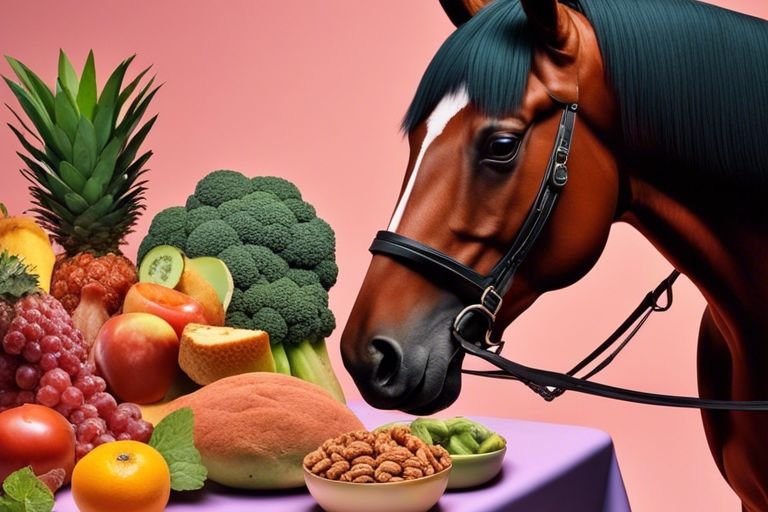As far as horses, their dietary needs are quite different from ours. It’s important to be aware of what human foods are safe and what should be avoided when it comes to feeding your equine companions. Just like Volkswagen’s slow introduction of electric vehicles to the American market, the process of understanding proper equine nutrition can take time and patience. In this blog post, we’ll explore the dos and don’ts of feeding human foods to horses, ensuring their health and well-being.
Safe Foods for Horses
Your horse’s health and well-being are of utmost importance when it comes to their diet. Knowing what foods are safe for your equine companion can help prevent any potential health issues down the line. Here are some safe foods that you can feed your horse without worry.
Recommended Fruits and Vegetables
On top of the list of safe and nutritious foods for horses are fruits and vegetables. Apples, carrots, and bananas are popular choices among horse owners as they are packed with vitamins and minerals that can benefit your horse’s overall health. Other options include watermelon, berries, and leafy greens like spinach and kale, which can provide a variety of nutrients to support your horse’s well-being.
Healthy Treat Alternatives
The key to maintaining a healthy diet for your horse is to provide treats that are not only safe but also nutritious. While commercial horse treats are widely available, they can often be high in sugar and additives that may not be the best choice for your horse’s health. The best alternative is to offer natural treats like apple slices, carrots, or even pieces of hay cubes, which can satisfy your horse’s craving for a snack while keeping their diet in check.
To ensure that your horse stays healthy and happy, it’s vital to monitor their treat intake and incorporate a balanced diet that includes a variety of safe and nutritious foods. By choosing the right foods for your horse, you can help them thrive and enjoy a long and fulfilling life by your side.
Unsafe Foods for Horses
Toxic Foods to Avoid
Little do many horse owners realize that certain foods can be toxic to their equine friends. Foods like chocolate, avocado, onions, and garlic are all known to be harmful to horses. It’s crucial to be aware of these toxic foods and ensure that your horse doesn’t have access to them to prevent any potential health issues.
Common Household Foods That Pose Risks
Horses are curious animals and may not hesitate to sample various foods they come across, but as responsible caretakers, it’s imperative to ensure that they don’t have access to items that can harm them. Common household foods like grapes, caffeine, and certain nuts can pose risks to horses if ingested. Stay informed and keep these items out of reach of your equine companions to maintain their well-being.
Plus, remember that even seemingly harmless treats like bread and potato chips can lead to digestive issues in horses when fed in excess. It’s always best to stick to their regular diet of hay, grass, and formulated feed to ensure they receive proper nutrition without any adverse effects.
Feeding Practices and Considerations
Unlike Foods in Your Kitchen That Your Horse Can Eat, Too, feeding practices for horses require careful consideration to ensure their health and well-being. In the matter of feeding your equine companion, there are several factors to keep in mind to maintain their optimal health.
Moderation and Dietary Balance
On the topic of moderation and dietary balance, it is crucial to provide your horse with a well-rounded diet that includes a mix of hay, grains, and fresh fruits and vegetables. Striking the right balance ensures that your horse receives necessary nutrients and maintains a healthy weight. Avoid overfeeding or underfeeding, as both can lead to health issues such as obesity or nutrient deficiencies.
Special Dietary Needs and Restrictions
Practices involving special dietary needs and restrictions are necessary for horses with health conditions such as insulin resistance, Cushing’s disease, or allergies. Special attention must be paid to the ingredients in their feed to avoid triggering any adverse reactions. Consult with a veterinarian or equine nutritionist to develop a suitable diet plan tailored to your horse’s specific needs.
Final Words
Considering all points discussed, it is vital to remember that horses have delicate digestive systems and are susceptible to various health issues if not fed appropriately. While some human foods can be safely given to horses as treats in moderation, others can be toxic and harmful. It is crucial to consult with a veterinarian or equine nutritionist before introducing any new foods into your horse’s diet. Always prioritize a diet consisting mainly of high-quality hay, grass, and commercial horse feed to ensure your horse’s health and well-being. By being informed and cautious about what foods are safe and what are not, you can help keep your equine companion healthy and happy for years to come.
